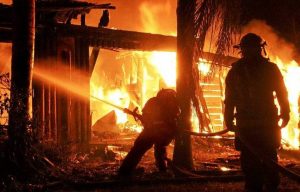It’s estimated that nearly 30 million people experience a house fire just during the holidays, according to InsuranceQuotes.com. The National Fire Prevention Association reports more than half a million properties are destroyed annually by fire, with nearly 80 percent of those being residential properties. When someone is injured – or worse, killed – in one of these incidents, it can be utterly devastating. Part of picking up the pieces means determining whether certain parties may be liable for the fire, and whether home insurance or some other entity may be required to pay damages to survivors. 
Recently, the Connecticut Supreme Court considered a house fire liability lawsuit brought by the estate representative for a mother and her three children all killed in a fire at a public housing complex. Defendants in the case were the city fire department and five city officials. Plaintiff alleged the city was negligent in its failure to inspect smoke detection equipment in decedent’s unit in compliance with the applicable fire safety regulations and codes.
Although the trial court granted summary judgment in favor of defendants, finding they were entitled to sovereign immunity, the appellate court reversed and the state supreme court affirmed, finding a jury could reasonably find defendants displayed reckless disregard for the health and safety of the public. This is the standard necessary in that state to overcome a defense of immunity against a government agency or official, which means there is a possibility defendants could be held liable. Now the case can go to trial.
Evidence presented to the state high court showed that many of the apartment residents at this site disabled their smoke detectors due to frequent false alarms set off by cooking. It was undisputed that this was common knowledge among city officials, nor was it disputed that city officials failed to conduct a mandatory inspection of the apartment unit in question in the two years prior to the fire. However, the day before the fire, officials reported they did inspect the unit and replaced one that was non-functioning and replaced a battery in the other. Hours later, a fire broke out and all four occupants of the unit were found deceased. The cause of the fire was later determined to be accidental.
Plaintiff alleges the fire officials failed to remedy the defects in the smoke detectors in the unit and knew/ should have known about (and remedied) a number of other safety defects in the unit, including the absence of a fire escape or other means of egress from the unit, as well as a lack of fire suppression (sprinkler) systems.
Most fire injury claims like this would be covered through homeowners’ insurance, though as this case shows, there may be a number of other legal avenues to explore. That’s why it’s imperative to discuss your options with an experienced Fort Lauderdale personal injury attorney. A property owner’s umbrella insurance could cover some of the costs. Further, if the fire broke out at a hotel or other commercial property, it’s possible a commercial liability policy would cover damages.
Call Fort Lauderdale Injury Attorney Richard Ansara at (954) 761-4011. Serving Broward, Miami-Dade and Palm Beach counties.
Additional Resources:
Williams v. Housing Authority of City of Bridgeport, Dec. 26, 2017, Connecticut Supreme Court
More Blog Entries:
Consumer Affairs Releases Top 10 Most Dangerous Toys of 2017, Nov. 29, 2017, Florida Injury Lawyer Blog
 Broward Injury Lawyer Blog
Broward Injury Lawyer Blog



